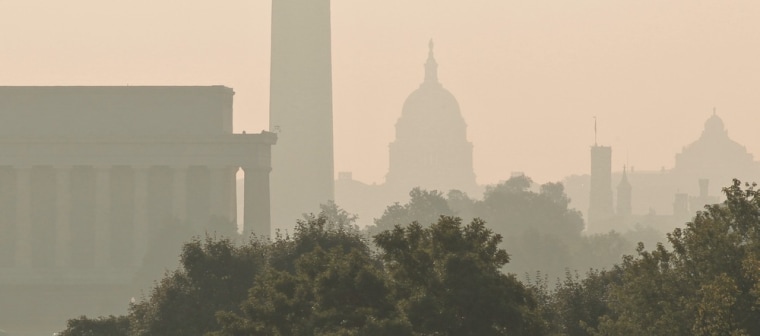Citing the financial burden in a struggling economy and after Republican protests, President Barack Obama on Friday ordered the Environmental Protection Agency to shelve a proposal to tighten smog standards.
"I have continued to underscore the importance of reducing regulatory burdens and regulatory uncertainty, particularly as our economy continues to recover," Obama said in a statement announcing the order.
Environmental activists immediately pounced on the move as a retreat by a weakened Obama administration trying to cut deals with Republicans in Congress. And the American Lung Association vowed to fight the move in court.
The withdrawal of the proposed rule comes two days after the White House, at the request of Republicans, identified seven such regulations that it promised to review after finding each would cost industry at least $1 billion.
The proposed smog standard would have required cities to lower ozone emissions, most of which come from power plants, vehicles and factories. It was estimated to cost anywhere between $19 billion and $90 billion, depending on how strictly enforced it would be.
The EPA earlier estimated the rule would save as much as $100 billion in health costs, and help prevent as many as 12,000 premature deaths from heart and lung complications.
EPA chief Lisa Jackson issued her own statement, citing past accomplishments and ending with a curt: "We will revisit the ozone standard, in compliance with the Clean Air Act."
Obama said his decision was also meant to streamline future smog rulemaking.
"Work is already underway to update a 2006 review of the science that will result in the reconsideration of the ozone standard in 2013," he said. "Ultimately, I did not support asking state and local governments to begin implementing a new standard that will soon be reconsidered."
Boehner: 'Good first step'
Republican lawmakers have blamed what they see as excessive regulations for some of the country's economic woes.
House Speaker John Boehner, R-Ohio, welcomed the move. "This is certainly a good first step," said his spokesman, Michael Steel.
The utility industry welcomed the move as well and asked for more changes.
"The pending ozone rule was just one part of a maze of overlapping and costly rules in store for American industry and most especially for the power sector," said Scott Segal, director of the Electric Reliability Coordinating Council, a trade group.
Rules on air toxics and transport, he added, "are likely to result in substantial unemployment across dozens of industrial sectors, increase electric rates for strapped American families, schools and hospitals, and decreased electric reliability."
House Majority Leader Eric Cantor, R-Va., pledged last week to try to block four environmental regulations, including the one on smog, when Republicans return to Congress after Labor Day.
But perhaps more than some of the other regulations under attack, the ground-level ozone standard is most closely associated with public health — something the president said he wouldn't compromise in his regulatory review.
Ozone is the main ingredient in smog, which is a powerful lung irritant that occasionally forces cancellation of school recesses, and causes asthma and other lung ailments.
Environmentalists angry
Criticism from environmentalists, a core Obama constituency, was swift.
"The Obama administration is caving to big polluters at the expense of protecting the air we breathe," said Gene Karpinski, president of the League of Conservation Voters. "This is a huge win for corporate polluters and huge loss for public health."
"We have a president taking his cues from Eric Cantor," added Friends of the Earth director David Hirsch. "His decision will mean more children suffering from asthma and more permanent lung damage for adults."
"Adding insult to injury," Hirsch said, "President Obama claimed that asking corporations to act responsibly is too much of a 'burden' for them, ignoring the fact that studies show responsible environmental protections spur investment in clean technology and create jobs."
The decision mirrors one made by Obama's predecessor, President George W. Bush. EPA scientists had recommended a stricter standard to better protect public health. Bush personally intervened after hearing complaints from electric utilities and other affected industries. His EPA set a standard of 75 parts per billion, stricter than one adopted in 1997, but not as strong as federal scientists said was needed to protect public health.
The EPA under Obama proposed in January 2010 a range for the concentration of ground-level ozone allowed in the air — from 60 parts per billion to 70 parts per billion. That's about equal to a single tennis ball in an Olympic-size swimming pool full of tennis balls.
A senior EPA official during the Bush administration described Obama's move as a retreat on his "green jobs" strategy.
"For the last 2 years, the administration has tried to convince people that EPA regulations actually help the economy by creating green jobs," said Jeff Holmstead, who headed the EPA's air pollution office. "I think they’ve realized that most people just aren’t buying it.”
"There are still a bunch of new EPA rules that are keeping industry from investing," added Holmstead, who now heads environmental strategies at the Washington lobbying and law firm Bracewell & Giuliani. "Unless it’s a green project, you just can’t get a permit from EPA. Even for green projects, the permitting process can take years."
Friday's announcement came as a new government report showed the unemployment rate remained stuck at 9.1 percent in August.
Obama has scheduled a primetime speech to a joint session of Congress and the nation next Thursday night to outline plans he has made for combating high joblessness and spurring economic growth.
